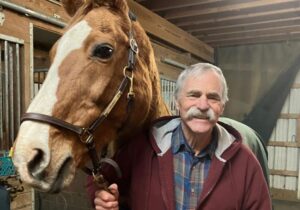EPA Update on Existing Stocks Provisions for Three Chlorpyrifos Products (with Editor commentary)
EPA Update on Existing Stocks Provisions for Three Chlorpyrifos Products (with Editor commentary)
Endangered Species Act: What will soon change for pesticide labelling and uses?
Endangered Species Act and Pesticides: How will pesticide labels change to protect endangered species?
Wednesday, March 20 at 11 a.m – Webinar
Enacted in 1973, the Endangered Species Act (ESA) requires all federal agencies to consider the impact to threatened and endangered species and their critical habitat when making decisions. The Environmental Protection Agency (EPA) has faced numerous lawsuits for its failure to consider the Act when issuing pesticide registrations—resulting in a 2023 commitment from the Agency’s Office of Pesticide Programs that puts the ESA at the forefront of all future registrations and some registration renewals.
The NYS IPM program at Cornell will be hosting Dr. Bill Chism, Chair of the Endangered Species Act Committee for the Weed Science Society of America (WSSA), to give a webinar on March 20th (at 11 a.m.) with the following objectives:
- • Inform us about the history of Endangered Species Act (ESA),
- Discuss the requirements of all Federal agencies to comply with the ESA,
- Describe the EPA’s current workplan (including the proposed Herbicide Strategy) to meet their statutory obligations,
- Explains what this might mean for future pesticide labeling efforts.
Registration: Endangered Species Act and Pesticides: An Example | CALS (cornell.edu)
About the Speaker

Bill Chism is the chair of the Endangered Species Act Committee of the Weed Science Society of America (WSSA). He retired after more than two decades with the EPA, where he conducted assessments on the benefits of pesticides to farmers as part of the registration review process. Bill grew up working on a vegetable farm in the Salinas Valley of California. He worked in extension researching weed control research on vegetable crops before earning his PhD in Weed Science from Virginia Tech and spent 10 years working for a pesticide registrant.
Free webinar: Tools for Weed Identification and Management – March 14
Rutgers Cooperative Extension of Cape May County will host a free, virtual presentation for farmers:
Tools for Weed Identification and Management
Thursday, March 14, 2024
6:00 to 7:00 p.m
The presenter will be Thierry E. Besançon, PhD, Associate Professor and Extension Weed Science Specialist for Specialty Crops, Rutgers University, Philip E. Marucci Center for Blueberry and Cranberry Research and Extension.
The informational talk, geared to local farmers, will review some of the available tools (books, apps, etc.) for helping with identification of weeds, cover nonchemical and chemical strategies for controlling weeds, and talk about what the future of weed management looks like.
Advanced registration for this presentation is required. To register, go to: https://go.rutgers.edu/xsvkelyg. You will receive the zoom meeting invitation with your registration confirmation.
For more information, please call 609-465-5115, ext. 3615 or email capemayag@njaes.rutgers.edu.
Take a quick survey to help with Field Equipment Sanitation Research!
In a Specialty Crop Research Initiative (SCRI) grant designed to guide future solution and resources centered around field equipment sanitation, collaborative team comprising pathologists, weed scientists, agronomists, and experts in agricultural equipment sanitation has crafted a questionnaire. This questionnaire is designed to gather growers’ input on their current practices and determine the necessity for implementing new ones.
The research will develop a more comprehensive understanding of the challenges associated with field equipment sanitation and work toward developing solutions that are effective, implementable and sustainable.
To introduce the survey and forthcoming research effort, Dr. Matt Grieshop, lead PI on this project indicates that “We are a group of agricultural research and extension professionals from across the United States that are curious about grower and agricultural professional perceptions about the importance of field equipment sanitation to mitigate the spread of organisms that pose human health, weed, plant pathogen or other risks.
Agricultural field equipment includes tillage implements, tractors, harvesters, cultivation equipment, trucks, trailers, sprayers, mowers, or any other piece of equipment that is shared across fields.
This information will be solely used to help frame future research questions and outreach activities. It will not be published or distributed in any form. Answering should take 5 minutes or less and is completely voluntary and anonymous.
Your participation is invaluable to future developments in the industry regarding food safety and equipment sanitation. We need more inputs from New Jersey specialty crops growers so that they have a say on the direction that field equipment sanitation research will take in the future!
To contribute, visit here or scan the QR code below.

If you have questions, comments or concerns contact Dr. Matt Grieshop at mgriesho@calpoly.edu or Dr. Thierry Besancon at thierry.besancon@rutgers.edu.
Update on Xtend-specific dicamba products registration
On February 6, 2024, the U.S. District Court of Arizona vacated the registrations of three dicamba products (Engenia 5L, Xtendimax 2.9L and Tavium 3.39CS) labeled for over-the-top use in Xtend and XtendFlex soybean systems. After several days of uncertainty, we now have guidance from the EPA about use of these products in the 2024 growing season. Based on the Court’s decision, the EPA considers these products to be no longer registered but allows for use of existing stocks under limited conditions:
- Use of products: The EPA’s “existing stocks order” allows private and commercial applicators to use existing stocks that were acquired by May 31, 2024. Applications of these products are permitted until June 30, 2024, in Xtend brand soybean fields.
- Distribution and sale: The EPA order limits further distribution and sales of these products to only existing stocks that were in possession of dealers prior to February 6, 2024, to facilitate use of the product by the June 30 deadline. In other words, the major manufacturers/registrants of these products are not allowed to sell them anymore, but any dealers with an existing inventory may sell these products until May 31, 2024, and applicators may spray them, according to their label, until June 30, 2024.
- Dicamba training: To use any of these Xtend-specific dicamba products, special dicamba training must be done annually to purchase and apply them. Training is reciprocal across brands, meaning an applicator only needs to take one dicamba-specific training each year; no matter what product is used, and which organization does the training. For more information about online dicamba training options and other specifics see:
Keep in mind, other dicamba-containing products such as Clarity, Diflexx, Status, and the many generics cannot be legally sprayed over-the-top of Xtend brand soybeans. However, the use of glyphosate and glufosinate (Liberty, etc.) products can still be used depending on the variety.
Enlist E3 soybean varieties have not been affected by this lawsuit and thus registered 2,4-D choline products (Enlist One and Duo) can be used in that system. These and other 2,4-D products cannot be applied over-the-top in Xtend/XtendFlex soybean systems, otherwise major crop damage will occur.
We will continue to provide updates if more details emerge. The EPA order and summary can be found here: Existing Stocks Order for Dicamba Products Previously Registered for Over-the-Top Use on Dicamba-Tolerant Cotton and Soybean (PDF).
